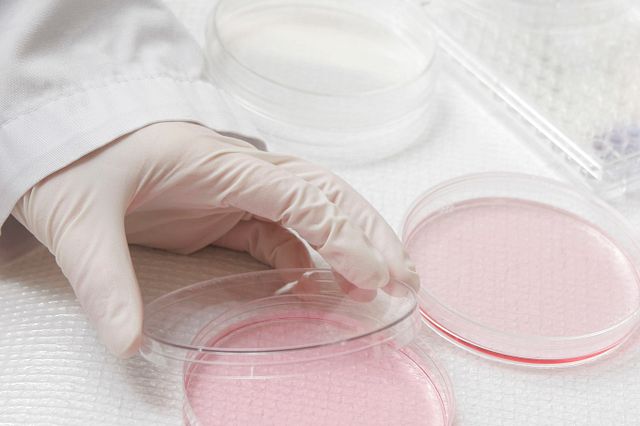ISO 10993-5 Cytotoxicity Testing of Medical AM Components
The ISO 10993-5 standard is one of the most critical tests within the broader ISO 10993 suite, which ensures that medical devices are safe for human use. This test specifically evaluates cytotoxicity, a measure of the potential of materials to cause cellular damage upon contact with living tissue. In the context of Additive Manufacturing (AM) and 3D printing, this testing is essential as it ensures that the components used in medical applications do not pose a risk to patients.
The process involves exposing cultured cells to extracts from the AM component under controlled conditions over a period of up to five days. The extract is typically prepared by soaking the part in a buffered saline solution and then filtering this solution through a membrane filter before analysis. This method allows for an accurate assessment of any toxic effects on human cells.
The primary focus of ISO 10993-5 testing is to determine whether there are any adverse reactions such as cell death, necrosis, or inflammation. The test results are evaluated using both visual inspection and statistical analysis of the cellular response data. Compliance with this standard ensures that medical AM components meet rigorous safety standards.
For R&D engineers and quality managers working in this field, understanding these tests is crucial for ensuring product safety. This testing not only helps comply with regulatory requirements but also enhances brand reputation by demonstrating a commitment to patient safety. Additionally, it supports the development of innovative products that can be trusted in critical medical applications.
The use of AM technology allows for precise customization of medical devices tailored to individual patients' needs. However, ensuring these custom components are safe is paramount. ISO 10993-5 testing plays a vital role in this process by providing assurance that the materials used are biocompatible and pose no harm when in contact with biological tissues.
This testing is particularly important given the increasing demand for personalized medicine solutions, where AM technology offers unique opportunities to create bespoke implants, prosthetics, and other medical devices. By adhering to these standards, manufacturers can confidently bring safe products to market, thereby improving patient outcomes and enhancing overall healthcare delivery.
| Application | Description |
|---|---|
| Bio-Compatible Implants | Evaluating the safety of titanium alloy parts used in hip replacements or spinal fusion devices. |
| Tissue Engineering | Testing scaffolds made from polyetherurethane for their potential to support cell growth and tissue regeneration. |
| Custom Orthopedic Devices | Ensuring that 3D-printed bone implants are safe before surgical use. |
The importance of this testing cannot be overstated, especially as AM continues to evolve. As technology advances, so too do our capabilities for producing increasingly sophisticated medical devices. Ensuring these innovations meet the highest safety standards is essential, and ISO 10993-5 testing provides a robust framework for achieving this.
Frequently Asked Questions
Customer Impact and Satisfaction
- Ensures regulatory compliance with international standards.
- Enhances brand reputation by demonstrating a commitment to patient safety.
- Facilitates the development of innovative, safe products tailored to individual needs.
- Promotes trust in medical AM technology through rigorous testing protocols.
The results of these tests directly translate into customer satisfaction and trust. Compliance with ISO 10993-5 not only ensures that healthcare providers can rely on the safety of their products but also allows them to focus more on delivering superior care rather than worrying about potential risks associated with material toxicity.
Competitive Advantage and Market Impact
Adhering to ISO 10993-5 provides a significant competitive advantage by setting higher safety benchmarks for your products. This can lead to increased market share as healthcare providers increasingly prefer suppliers who can demonstrate comprehensive adherence to international standards.
Achieving this certification also opens doors for collaboration with leading institutions and organizations, potentially expanding research opportunities and partnerships within the medical community.
Use Cases and Application Examples
- Evaluating bio-compatible implants made from titanium alloys.
- Testing tissue engineering scaffolds used in regenerative medicine.
- Ensuring safety of custom orthopedic devices used in surgeries.
The versatility of ISO 10993-5 testing allows it to be applied across various sectors within the medical AM industry, making it a versatile tool for ensuring product safety and quality.





